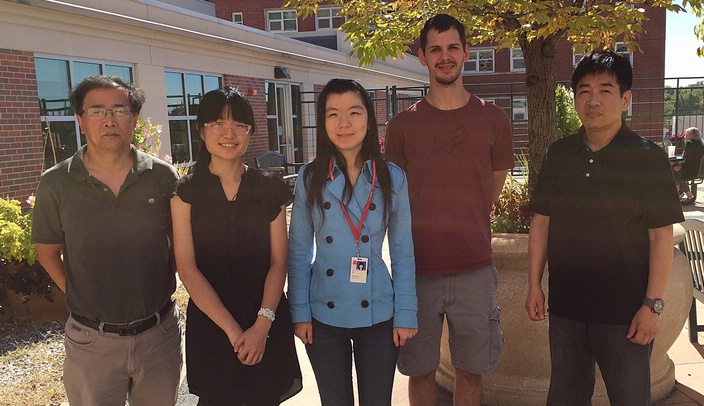Eight to twelve weeks is a short time to produce anything in a lab. However, researchers can produce great results in this short time if they plan properly. This is demonstrated by a recent publication in the journal Oncotarget (impact factor 6.36 in 2014) by San Ming Wang, M.D., and several China Scholarship Council Ph.D. and summer research program students.
This study was conducted to determine the prevalence and spectrum of BRCA1 and BRCA2 genetic mutation among the Mainland Chinese population. BRCA1 and BRCA2 are two important genes to protect genomic stability. Mutations in these two genes lead to high susceptibility to breast and ovarian cancer.
For this study, summer research program students Linli Zhao (2014) and Hanwen Zhang (2015), both current students at Shandong University, worked with China Scholarship Council Ph.D. students Fengxia Xiao (graduated 2014) and Jian Cui and others. They conducted an extensive literature analysis on BRCA1 and BRCA2 gene variation from nearly 4,000 Mainland Chinese familial breast and cancer patients, which is the most comprehensive BRCA study on a Chinese population. Data from this study demonstrate that the prevalence of BRCA mutation amongst Mainland Chinese breast and ovarian cancer patients is at a level similar to ones from other populations. However, the spectrum of mutation is very different from European and North American populations.
This study adds to knowledge about BRCA mutation among people of Mainland Chinese descent, thus helping to aid in accurate diagnosis of familial breast and ovarian cancer in Chinese populations. Most information regarding BRCA1 and BRCA2 mutations has come from European and North American populations and is used extensively in the West to guide clinical diagnosis. Due to the lack of information from Chinese populations, the mutations identified from Western populations are routinely used in diagnosis in Mainland China. The study by Dr. Wang’s group will rectify this. "The data from this study will likely serve as a standard for clinical diagnosis of Chinese familial breast and ovarian cancer," he says.
Sharing knowledge such as this is one reason why international collaborative programs and research are so important.
This study combined the advanced research done at UNMC with the unique skills offered by Chinese students. On the one side, the study drew on the expertise of UNMC researchers to promote medicine and science in China. Dr. Wang’s lab uses genomic tools to study the genetics of familial breast cancer in mostly North American patients. It was easy to apply the same system to study similar questions for Chinese cancer patients, he says. On the other side, the study took advantage of the Chinese students’ unique linguistic and research skills. These students read materials published in Chinese and have the know-how to access and mine materials published in Chinese and only indexed in Chinese scientific databases. This enabled them to collect comprehensive information to support the study.
Finally, the study is interesting pedagogically. Summer research program students are only at UNMC for eight to twelve weeks. It is important to maximize the students’ time here, Dr. Wang says. To do so, he designed the project "with sound scientific background, doable methodologies, and reportable data," he says. He contacted each student before they arrived to his lab so they could come up to speed with background knowledge for the project, form a clear picture of their roles in the study, and have a goal for their time on campus.
This study is available to read online. Support for the study was provided by grants from the National Institutes of Health, the China Scholarship Council, and the American Cancer Society International Research Grant.
The summer research program brings top students from Shandong University, Shanghai Jiao Tong University, Tongji University, and the University of the Chinese Academy of Science to UNMC to do research for eight to twelve weeks. Approximately 10-15% of the participants return to UNMC to pursue advanced degrees. Investigators interested in hosting a summer research student should contact the Asia Pacific Rim Development Program.
